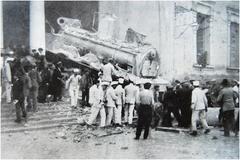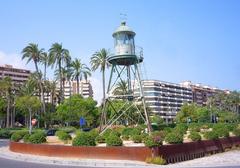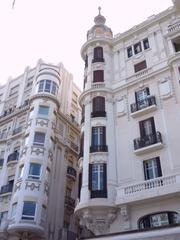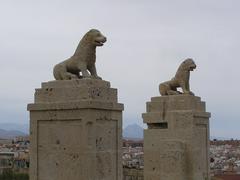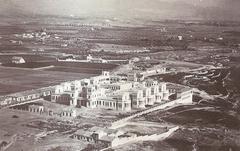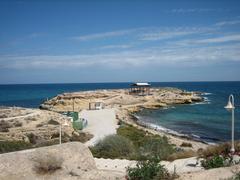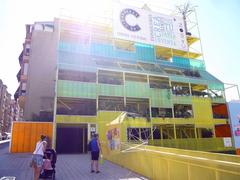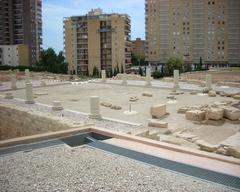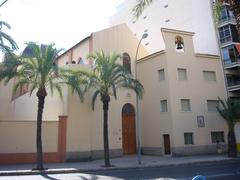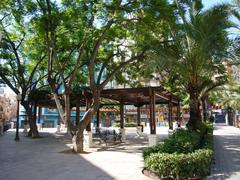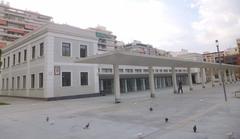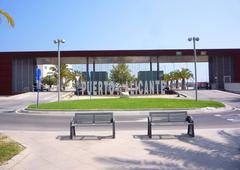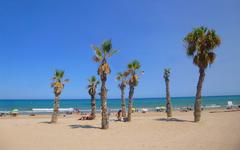Plaza De La Coruña Alicante, Spain: Visiting Hours, Tickets, and Travel Guide
Date: 04/07/2025
Introduction
Plaza De La Coruña, set in the vibrant Playa de San Juan district of Alicante, Spain, is a contemporary urban plaza that exemplifies the city’s blend of modernity, community life, and Mediterranean charm. Unlike historic squares in the city center, Plaza De La Coruña is a product of Alicante’s late 20th and early 21st-century expansion, offering a dynamic communal hub just 200 meters from the iconic Playa de San Juan beach. It functions as a key public transport interchange, a lively social space, and a welcoming destination for both residents and travelers.
This guide provides a detailed overview of Plaza De La Coruña, including its history, visiting hours, accessibility, transport links, local amenities, nearby historical sites, events, and practical visitor tips. Whether you’re seeking cultural immersion, a gateway to Alicante’s beaches, or simply a relaxing spot to experience local life, Plaza De La Coruña delivers on all fronts (Callejerode, Alicante Turismo, UrbanRail.Net).
Table of Contents
- Historical Background and Urban Development
- Location and Visiting Information
- Urban Infrastructure and Public Transport
- Accessibility and Travel Tips
- Socio-Cultural Impact and Community Life
- Events, Guided Tours, and Gastronomy
- Nearby Historical Sites and Attractions
- Practical Visitor Tips
- Frequently Asked Questions (FAQ)
- Conclusion
- References
Historical Background and Urban Development
Alicante’s strategic position on the Mediterranean has shaped its urban growth for centuries. The Playa de San Juan district, where Plaza De La Coruña is located, underwent significant development in the late 20th century, coinciding with the tourism boom on the Costa Blanca (Spanish Plains). The plaza itself reflects the city’s focus on accessible, communal urban spaces, designed to foster social interaction and offer residents a modern, open environment.
The plaza’s name pays tribute to the Galician city of A Coruña, highlighting a broader Spanish tradition of naming urban features after other cities to promote national unity and cultural exchange. Its contemporary design, pedestrian-friendly layout, and Mediterranean landscaping embody Alicante’s commitment to sustainable, inclusive urban planning (Callejerode).
Location and Visiting Information
Plaza De La Coruña is positioned at the northern edge of Alicante, within the Playa de San Juan district. It sits near the intersection of Avenida de la Condomina and Avenida de las Naciones, just a short walk from Playa de San Juan’s renowned sands. The exact coordinates are approximately 38.3747° N, -0.4062° W, about 6 kilometers from Alicante’s historic center (Alicante Turismo).
Visiting Hours:
The plaza is an open public space, accessible 24 hours a day, year-round. There are no entrance fees or tickets required, making it ideal for spontaneous visits.
Urban Infrastructure and Public Transport
TRAM Network Integration
Plaza De La Coruña is a vital hub in Alicante’s modern public transport system. It is the terminus for TRAM Metropolitano lines 4 and 5, offering direct connections to the city center, beaches, and key districts:
- Line L4: Connects Luceros (city center) with Plaza de La Coruña. Travel time is approximately 27–30 minutes, with frequent service during peak hours.
- Line L5: Runs from Puerta del Mar (city marina) to Plaza de La Coruña, passing through important stops like Miriam Blasco and Avenida de las Naciones (UrbanRail.Net).
The TRAM network is fully accessible, featuring low-floor trams and facilities for people with reduced mobility. Real-time information and affordable tickets enhance the travel experience (AlicanteAbout).
Bus and Road Access
Several TAM bus lines (21, 22, and 31) serve the area, connecting the plaza with other neighborhoods and nearby towns. For those arriving by car, ample street and public parking are available, though spaces can fill up quickly during summer.
Pedestrian and Bicycle Access
Wide, flat sidewalks and dedicated cycling lanes make the area around the plaza pedestrian and bike-friendly. The neighborhood’s design encourages walking and cycling, allowing easy exploration of nearby attractions.
Accessibility and Travel Tips
Plaza De La Coruña is designed for inclusivity, with accessible pathways, ramps, and seating suitable for wheelchairs and strollers. The surrounding infrastructure and public transport options ensure visitors with mobility challenges can navigate the area comfortably (Alicante Tram Info).
Travel Tips:
- Public transport is recommended, especially during busy seasons.
- Early mornings and late afternoons provide optimal conditions for photography and leisure.
- The plaza is considered safe and well-lit, suitable for families and solo travelers.
Socio-Cultural Impact and Community Life
Plaza De La Coruña is a focal point of community life in Playa de San Juan. Its open layout and landscaped environment invite social gatherings, outdoor activities, and informal neighborhood events. The plaza is surrounded by residential apartments, local shops, and cafes, creating a lively yet relaxed atmosphere.
While not a historic monument, it plays an active role in daily life, serving as a meeting place for families, friends, and visitors. Its proximity to the beach and integration with the TRAM further enhances its appeal (Callejerode).
Events, Guided Tours, and Gastronomy
Cultural Events and Festivals
The plaza participates in Alicante’s rich festival calendar, hosting artisan markets, live performances, and community activities. Notable events include:
- Hogueras de San Juan (June): Citywide celebrations with parades, fireworks, and communal meals.
- Las Cruces de Mayo: Traditional spring festivities with floral displays and music.
- Artisan fairs and pop-up exhibitions that showcase local crafts and artistic talent (Alicante Turismo).
Guided Tours
Several local tour operators include Plaza De La Coruña on walking tours of Alicante, often combining visits to the plaza with nearby historical sites and culinary hotspots. These guided experiences provide context on the area’s urban development and contemporary culture.
Gastronomy
The area surrounding Plaza De La Coruña is dotted with cafes, tapas bars, and bakeries. Visitors can sample local delights such as turrón, queso de cabra, and fresh seafood, often sourced from the nearby Mercado Central. Outdoor terraces offer al fresco dining, especially lively during food festivals.
Nearby Historical Sites and Attractions
Playa de San Juan
A short walk from the plaza, Playa de San Juan is one of Alicante’s most famous beaches, celebrated for its fine sand, clear waters, and excellent amenities (Tranio).
Lucentum Archaeological Site
Just two tram stops away, the Lucentum Archaeological Site preserves the remains of the Roman city of Lucentum, offering guided tours and educational displays (Alicante Turismo).
City Center Attractions
TRAM lines provide direct access to central Alicante sites such as:
- Castillo de Santa Bárbara: Panoramic fortress atop Mount Benacantil.
- Explanada de España: Mosaic-tiled promenade lined with palm trees.
- Barrio de Santa Cruz: Alicante’s old town, known for its winding streets and traditional tapas bars.
- Mercado Central: Bustling market hall showcasing local food and crafts.
Leisure and Outdoor Activities
- Albufereta Beach: A quieter, family-friendly beach nearby.
- Alicante Golf: An 18-hole course designed by Severiano Ballesteros.
- Cabo de las Huertas: Scenic cape perfect for snorkeling and sunset walks.
Practical Visitor Tips
- Transport: Purchase TRAM tickets at stations or via apps. Single journey within Zone A costs about €1.45.
- Operating Hours: TRAM runs from early morning until midnight; check schedules for holidays.
- Language: Spanish is predominant, but English is common in tourist areas.
- Weather: Mediterranean climate; pack sunscreen, water, and hats in summer.
- Safety: The area is safe, with regular patrols and well-lit streets.
Frequently Asked Questions (FAQ)
Q: What are the visiting hours for Plaza De La Coruña?
A: The plaza is open 24/7 with no entrance fees.
Q: Do I need tickets to visit Plaza De La Coruña?
A: No tickets are required. Tickets may be needed for certain events or nearby attractions.
Q: Is the plaza accessible for visitors with disabilities?
A: Yes, Plaza De La Coruña and its transport connections are fully accessible.
Q: How do I reach the plaza from Alicante-Elche Airport?
A: Take the C6 airport bus to the city center, then transfer to TRAM Line L4 or L5.
Q: Which historical sites are near Plaza De La Coruña?
A: Lucentum Archaeological Site, Castillo de Santa Bárbara, Explanada de España, and Mercado Central are within easy reach.
Conclusion
Plaza De La Coruña is a model of Alicante’s modern urban vision, combining efficient public transport, inclusive design, and a community-oriented atmosphere near one of the city’s premier beaches. Its accessibility, cultural vibrancy, and connection to both daily life and special events make it an essential stop for anyone seeking to experience contemporary Alicante.
Whether relaxing in its landscaped spaces, joining a festival, or using it as a base to explore Alicante’s historical and cultural heritage, Plaza De La Coruña welcomes all. For the best experience, check official resources for event updates, consider guided tours, and use the Audiala app for interactive guides and real-time information.
References
- Callejerode: https://callejerode.com/alicante/plaza-la-coruna
- Alicante Turismo: https://alicanteturismo.com/en/culture-in-alicante/
- Alicante Turismo – Monuments and Historical Heritage: https://alicanteturismo.com/en/monuments-and-historical-heritage/
- UrbanRail.Net: https://www.urbanrail.net/eu/es/alicante/alacant.htm
- AlicanteAbout: https://alicanteabout.com/transport/alicante-tram-prices-timetables-routes/
- Alicante City Agenda: https://www.alicante.es/es/agenda/cultural
- Tranio: https://tranio.com/articles/things-to-do-in-alicante/
- Spanish Plains: https://www.spanishplains.com/unveiling-alicantes-history-a-journey-through-the-historic-city/
For more Alicante travel tips and the latest event updates, download the Audiala app and follow us on social media.
